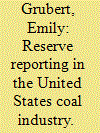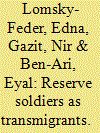|
|
|
Sort Order |
|
|
|
Items / Page
|
|
|
|
|
|
|
| Srl | Item |
| 1 |
ID:
124060


|
|
|
|
|
| Publication |
2013.
|
| Summary/Abstract |
This study examines the construction of US Army National Guard members' dual identities as soldiers and civilians and posits processes, including behavioral practice, spatial displacement, and narrativity, which soldiers use to reconcile these potentially contradictory identities to develop an understanding of themselves as "citizen-soldiers." Ethnographic evidence gathered from in-depth interviews suggests that for National Guard members who have never experienced deployment, the two identities of civilian and soldier are mostly separated. However, after experiencing deployment and reintegration, soldier and civilian identities become more intertwined and individuals must reorganize their identity according to different conceptions; integrating on a more permanent basis two different cultural modes of being. In light of the National Guard's increased participation in deployments post-9/11, this reorganization of identity is contributing to a shift in the meaning of "citizen-soldiery" in the current US context.
|
|
|
|
|
|
|
|
|
|
|
|
|
|
|
|
| 2 |
ID:
088039


|
|
|
|
|
| Publication |
2009.
|
| Summary/Abstract |
Although the markets for ancillary services at the North American Independent System Operators are often structured in quite different ways there is an emerging set of core design elements that represent a rough consensus as to what the optimal design configuration for ancillary services should be, albeit with some regional variation. This paper looks back at how the design of ancillary services markets has recently evolved to put this development in context. Thereafter it examines the methods by which ancillary services are procured by highlighting the procurement practices at a number of different Independent System Operators, principally those in California, New York, New England, Texas and the PJM Interconnection, in an attempt to tease out the remaining reasons why the ancillary service markets are still so different. This is important as there are many innovations that are not rooted in regional differences but reflect genuine technical advances and economic efficiency gains and can be replicated across other ISOs to produce more efficient designs, greater reliability and lower costs.
|
|
|
|
|
|
|
|
|
|
|
|
|
|
|
|
| 3 |
ID:
144727


|
|
|
|
|
| Summary/Abstract |
In recent years, there has been a sharp growth in political and sociological interest in the British military. Set against the backdrop of the armed forces’ increasing presence in everyday life, alongside the organizations’ ongoing restructuring, the current paper focuses on the MoD’s problematic attempts to recruit 30,000 reservists by 2020; what has become known as the Future Reserves 2020 programme (FR2020). We argue that these changes are driven in part by the need to cut costs in defence. However, we also suggest that they are a reflection of the changing nature of modern military organisation, and the manner in which armed forces engage with the societies of which they are a part, and with the citizens that make up that society. We locate FR2020 programme in the context of a wider narrative about the changing nature of military organisation in contemporary western democracies, identifying structural, circumstantial and normative reasons for change. We also examine the specific challenges of implementing FR2020 in practice, including issues of recruitment and retention, integration and support, and relations with families and employers, drawing on the experience of comparator countries to do so. We conclude by considering the implications of these changes, both for the future of UK armed forces, and for the evolving nature of military-society relations in Britain.
|
|
|
|
|
|
|
|
|
|
|
|
|
|
|
|
| 4 |
ID:
112300


|
|
|
|
|
| Publication |
2012.
|
| Summary/Abstract |
United States energy policymaking can be better supported with accurate and consistent data on coal reserves, both in the public and private sectors. In particular, reserve data for coal and other energy resources should be directly comparable so that decision-makers can easily understand the relationship among available resources. Long-term policy and investment choices regarding energy security, the environment, and resource allocation depend on accurate information, but existing and easily available data on the magnitude of geologically, environmentally, economically, socially, and legally accessible coal reserves are of insufficient quality to guide such decisions. Even still, these data are often presented for use in policy and energy analysis. Currently, coal reserves are overstated relative to competitor energy resource reserves, in part because coal reporting standards have historically been more liberal and vague than standards for resources like natural gas. Overstating the marketable coal resource could lead to inefficient allocation of limited capital investment that can be difficult to reverse. US government bodies like the Energy Information Administration, United States Geological Survey, Securities and Exchange Commission, and Bureau of Land Management can help correct deficiencies by clarifying standards and collecting data that are relevant for decision-makers, such as energy-based reserve information.
|
|
|
|
|
|
|
|
|
|
|
|
|
|
|
|
| 5 |
ID:
082696


|
|
|
|
|
| Publication |
2008.
|
| Summary/Abstract |
This article suggests a new perspective for examining the particular social and organizational characteristics of military reserves forces and the special experiences of serving in the reserves. To illustrate the unique social position of reservists, the authors develop a theoretical model that likens them to transmigrants. Accordingly, the authors suggest that society may benefit from looking at reserves both as sorts of social and organizational hybrids or amalgams-they are soldiers and civilians, they are outside yet inside the military system, and are invested in both spheres-and as continual migrants journeying between military and civilian spheres. The authors end by suggesting that it may be fruitful to study three segments of the military, each of which has its own dynamics: regulars, conscripts, and reserves. This differentiation allows society to examine different patterns of motivation, cohesion, political commitment and awareness, and long-term considerations that characterize each segment
|
|
|
|
|
|
|
|
|
|
|
|
|
|
|
|
| 6 |
ID:
149959


|
|
|
|
|
| Summary/Abstract |
Although China owns large coal reserves, it now faces the problem of depletion of its coal resources in advance. The coal-based energy mix in China will not change in the short term, and a means of delaying the coal resources depletion is therefore urgently required. The residual coal was exploited first with a lower recovery percentage and was evaluated as commercially valuable damaged coal. This approach is in comparison to past evaluations when the residual coal was allocated as exploitation losses. Coal recovery rates, the calculation method of residual coal reserves and statistics of its mines in China were given. On this basis, a discussion concerning the impacts on the delay of China's coal depletion, development of coal exploitation and sustainable developments, as well as technologies and relevant policies, were presented. It is considered that the exploitation of residual coal can effectively delay China's coal depletion, inhibit the construction of new mines, redress the imbalance between supply and demand of coal in eastern China, improve the mining area environment and guarantee social stability. The Chinese government supports the exploitation technologies of residual coal. Hence, exploiting residual coal is of considerable importance in sustainable development of the coal industry in China.
|
|
|
|
|
|
|
|
|
|
|
|
|
|
|
|
| 7 |
ID:
104334


|
|
|
|
|
| Publication |
2011.
|
| Summary/Abstract |
From 2001 through 2008, the US Department of Defense (DoD) has activated more than 700,000 military reservists. Activation imposes a variety of costs on reservists. Among those costs is potentially a decline in total earnings during the period of activation. In this paper, we use administrative data on military and civilian earnings to estimate how earnings change when reservists are activated and the causal effect of activation. Contrary to press accounts and DoD survey evidence, our estimates indicate that, on average, the earnings of activated reservists increase substantially when they are activated and that earnings losses are not common.
|
|
|
|
|
|
|
|
|
|
|
|
|
|
|
|
|
|
|
|
|